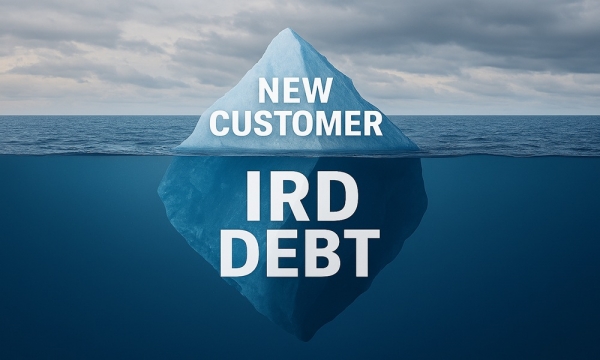Suppliers face a real challenge when trying to assess a potential customers’ IRD debt before they set up an account and provide them with credit. IRD debt levels are not publicly available information, so what can you do to protect yourself?
Why IRD Debt Is Hard to Detect?
IRD debt is considered confidential and is not listed on public registers like the Companies Office unless the IRD has issued a statutory demand and formal recovery actions like liquidation proceedings have commenced. Because of this an IRD debt may not necessarily appear on a traditional credit check. This lack of transparency means suppliers must rely on indirect methods to assess risk.
Warning Signs a Company May Have IRD Debt
- Poor Communication or Avoidance – Businesses that avoid discussing financials or are vague about payment terms may be hiding issues
- Frequent Changes in Directors or Shareholders – This can indicate instability or attempts to avoid liability.
- Negative Media or Industry Reputation – News reports or word-of-mouth about financial trouble or IRD scrutiny
- IRD Audit Activity – IRD has increased audits in industries with high cash transactions (e.g., hospitality, construction, retail), they are openly disclosing which sectors they are focusing on. If your customer is operating in that sector, it is probably worth taking the time to complete additional due diligence.
How Suppliers Can Protect Themselves?
Request financial information, ask for recent financial statements, GST returns, and confirmation of tax compliance. This can include a copy of their MYIR printout to see what is owed. If it is all showing zeroes, then go one step further and make sure they have no outstanding filings. While not foolproof, reluctance to provide these can be a red flag.
Use credit checks and trade references, services like Equifax or Centrix may show defaults or judgments, though IRD debt won’t appear unless formal action has been taken.
Include protective clauses in contracts, make sure you are requesting Personal Guarantees from directors, taking security over the assets you are supplying (and registering it on the PPSR), lastly included in your terms of trade should be the ability to request financials periodically once the account is set up.
Monitor the companies register, watch for changes in solvency status, liquidation notices, or director resignations. Alerts can be set up in your watchlist to advise you of any changes.
Ultimately the decision to supply lies in your hands and if they are not prepared to provide you with the requested documents or not everything appears to be checking out, this raises a red flag and you have a decision to make. You can ignore the warning signs and take the risk, you can provide a reduced level of credit on the account, you can put them on a cash account, or you can opt to not deal with them at all (while this can be a difficult decision it will often be the correct one if its being considered).

